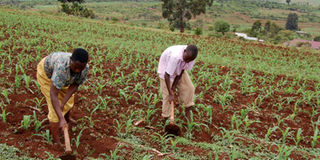Preparing the garden for crop production

The farmer may have to do it in two phases. Some people begin by digging up huge soil clods and then breaking them up later and making it easier for seed planting and germination.
What you need to know:
- If the soils are infertile it is advisable to seek advice from the area agricultural extension officer about what type of fertiliser to use especially if the farmer intends to use factory made fertilisers.
- In most cases however the liberal application of organic manure such as animal dung or compost by small scale farmers has supplied sufficient soil nutrients and led to high crop yields.
For successful crop production to take place good preparation and planning are very important. The farmer must think of the quality of seeds or plantlets to plant.
He must also think about the fertility levels of the soil in his garden as well as the weather patterns of the period during which he plans to grow the crops.
In some areas the soil will need fertilizers (organic or synthetic) to support vigorous crop growth.
If the weather patterns are hostile crop cultivation, perhaps involving long droughts, the farmer should plan for irrigation or purchasing drought tolerant seeds. He should also have a budget for the best seeds or plantlets.
Seeds quality depends very much on the farmer’s personal interest. Some people grow crops for their good taste; others are more concerned about yields and many others worry about resistance to pests and diseases or tolerance to drought.
It is important to loosen up the soil by tilling the land so that it facilitates full rainfall infiltration. Tilling also improves soil aeration and supports strong root growth. It can be done with the use of a hand hoe, an ox plough or a tractor before or at the beginning of the rain season.
The farmer may have to do it in two phases. Some people begin by digging up huge soil clods and then breaking them up later and making it easier for seed planting and germination.
All weeds must be removed and dried under the sun before they are buried underground to fertilise the soil. If they are not buried they can be used as mulch to promote water retention in the soil. Some weeds may sprout if they are buried in their green form.
If the soils are infertile it is advisable to seek advice from the area agricultural extension officer about what type of fertiliser to use especially if the farmer intends to use factory made fertilisers.
In most cases however the liberal application of organic manure such as animal dung or compost by small scale farmers has supplied sufficient soil nutrients and led to high crop yields.




